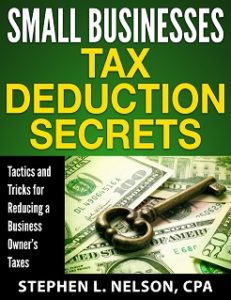
Recently, a handful of people have asked about this gambit where a small business owner turns a vacation home into a tax shelter.
Though I’m not a big fan of this technique, I’m going to discuss it here anyway.
In some situations, a small business owner probably can use the technique. Furthermore, understanding how the technique works, and when it probably doesn’t, points out some useful truths about taxes.
The Loophole in Question
The vacation home tax shelter trick flows from Sec. 280A of the Internal Revenue Code. Sec. 280A describes how you do the tax accounting for a second home such a vacation home that you both use personally and then also rent.
The tax law rules get complicated in many situations, but the law includes a de minimis exclusion that creates a slick loophole: If you use a property for more than 14 days and then rent a property for 14 days or less, you don’t have to include the rent in your income.
This sounds like no big deal. But the exclusion can produce large tax savings.
Example: You own a home in the Palm Springs area, close to where the immensely popular Coachella Music Festival occurs. While normally you use your little golf course bungalow during the winter months, for the the two weeks the festival goes on, you can rent your house for $2,000 a night or $14,000 a week. In this case, if you rent your house for both weeks of the festival, you can earn but exclude $28,000 of rent income.
Example: You own a lovely custom home in Augusta Georgia, conveniently close to the Augusta National Golf Course. You leave the area each year when the Masters Tournament occurs due to the crowds… but you do rent your home for $25,000 a week to a corporate sponsor participating in the event. You earn but exclude $50,000 of rent income.
How a Small Business Uses the Loophole
Though Congress occasionally argues about whether or not to continue this generous loophole, no one questions whether you can do something like I describe in either of the examples just mentioned. You can.
What people do wonder about is whether you can have your small business rent the “desert bungalow in Coachella” or the “custom house in Augusta”.
If you can, your business may be able to write (for example) a $28,000 check or a $50,000 check to you and your spouse, say. But the rent income isn’t taxable to you. And if the expense constitutes a valid deduction for your business, bingo, you’ve saved thousands in taxes.
So, the question is, does this really work?
I think the answer is “yes.” But taking this deduction resembles driving a car at 150 miles per hour… you need to know what you’re doing and you need to be careful. Super-careful.
Here’s why: Three potential problems crop up if you try to turn a vacation home into a small business tax loophole.
Loophole Problem #1: Qualifying as a Valid Deduction
The first problem? Well, while there’s not an issue with excluding the rent from your income, you still need to make sure that the expense qualifies as an ordinary and necessary business expense in order to take the deduction. And the deduction on your business tax return creates the tax savings. Not the rent income exclusion.
In the case of your small business (which would need to be a corporation or partnership, by the way), you would need to meet the requirements for establishing deductibility.
For example, say that your small business wants to deduct the expense of renting a desert bungalow down the street from the Coachella music festival as a travel expense. In this case, you would need to fully meet the requirements for deductible travel expenses.
Note: I describe in detail the requirements for deducting travel expenses in my small business tax deductions secrets ebook, but in a nutshell, you need to be traveling away from home for primarily business purposes. Oh, and the expenditures can’t be extravagant.
Anyway, that’s the first thing that surely trips up some people trying to take this deduction. In order to get the savings, your business needs a valid deduction.
Loophole Problem #2: Avoiding a Sham Transaction
Another threat to watch out for: You need to not have something that looks so flakey, you’re at risk for having some auditor or judge label your arrangement as a sham transaction.
In other words, you can’t do something so goofy that outsiders see your arrangement as only an artifice or scam to avoid taxes.
Example: A hardworking guitarist making (say) $50,000 a year in the music industry probably cannot use the Sec. 280A loophole to shelter $28,000 of rent. Even if the $28,000 of rent isn’t viewed as extravagant (and it probably is), the arrangement looks so goofy as to be laughable. Surely a sham, right?
Example: An equally hardworking guitarist making or hoping to make (say) $300,000 can do all of his annual marketing and selling and networking during the two weeks of Coachella. Here, perhaps spending $28,000 on rent and marketing may make more sense. Very possibly this isn’t a sham…
Loophole Problem #3: State and Local Excise and Franchise Taxes
Let me mention one other thing to consider if you’re contemplating turning a second home into a small business tax deduction.
While Sec. 280A lets you exclude rent income from income taxes, you may still be subject to state and local excise taxes if you rent a property for two weeks. Things like sales taxes and hotel and lodging taxes , in other words, might come into play and may add up to more than you think.
Furthermore, if you did play this gambit, you would want to stay alert to any state income taxes.
Example: Your business operates in Washington State but you run the Sec. 280A vacation home gambit to put a $28,000 deduction on your business tax return by renting a Palm Springs home to your corporation. Though this gambit may reduce your federal income taxes, you operating your business in California will probably create nexus in California and mean California can levy franchise taxes (which will add up quickly) and can probably tax at least a little bit of your business’s income.
Do You Own a Small Business? Want to Save Taxes?
Here’s something that I’ve noticed again and again about small businesses. They usually don’t do a very good job about maximizing their tax deductions.
More specifically, small business owners usually don’t go to the effort of structuring their business activities to protect legitimate deductions, to create new deductions and to recycle (or double-deduct) the deductions which can be used more than once to save taxes.
Which neatly brings me to my e-book, Small Businesses Tax Deduction Secrets. This 70pp e-book addresses this information short-fall by talking about how you can annually save thousands or even tens of thousands of dollars in taxes simply by more effectively using legitimate business deductions.
Click for more info or to purchase and download
And a quick note: If you’re a client of our CPA firm, you don’t need to purchase this ebook. We will happily provide you with free copies of any of our books, including this one. Just ask for a copy next time you talk to us.

Is there any reason other than space limitations that you did not include an example of a 187 change? Most of our clients expense materials and supplies when paid and do not maintain inventory….so 187 would apply instead of 186, correct? Do you recommend both 186 and 187 just to be safe? Or since the client is not making a change and has been and will continue to expense materials and supplies when paid, the 187 is not necessary?
I would say that we were primarily driven by constrains hered… I.e., we did example forms that seemed to be most applicable to our clients… but found ourselves very limited in what we had time and mostly “space” for in the ebook.
In answer to your question about whether to file both 186 and 187 to be safe, I would defer to your professional judgment here. If you think you have a client that requires both, you should file both.
That said, I would guess there’s very little marginal benefit in filing the third or fourth or fifth 3115… I think the riskiest course for CPAs is to not file any 3115s. That seems crazy.
However, given that presumably millions of tax returns will simply omit any 3115s, I would think your or my risk for only filing two instead of three is pretty low. Or maybe I shouldn’t say it that way… Maybe I should say that excuse #1 below sounds a whole lot better than excuse #2 below:
EXCUSE #1: “Oh, gee, Mr. IRS Agent? You’re right… we probably should have done a code 187 too.”
EXCUSE #2: “Oh, yeah, well, our clients didn’t want to pay for any 3115s so we didn’t do them. And we blew off the 8275Rs too.”
Sorry I don’t have a better response.